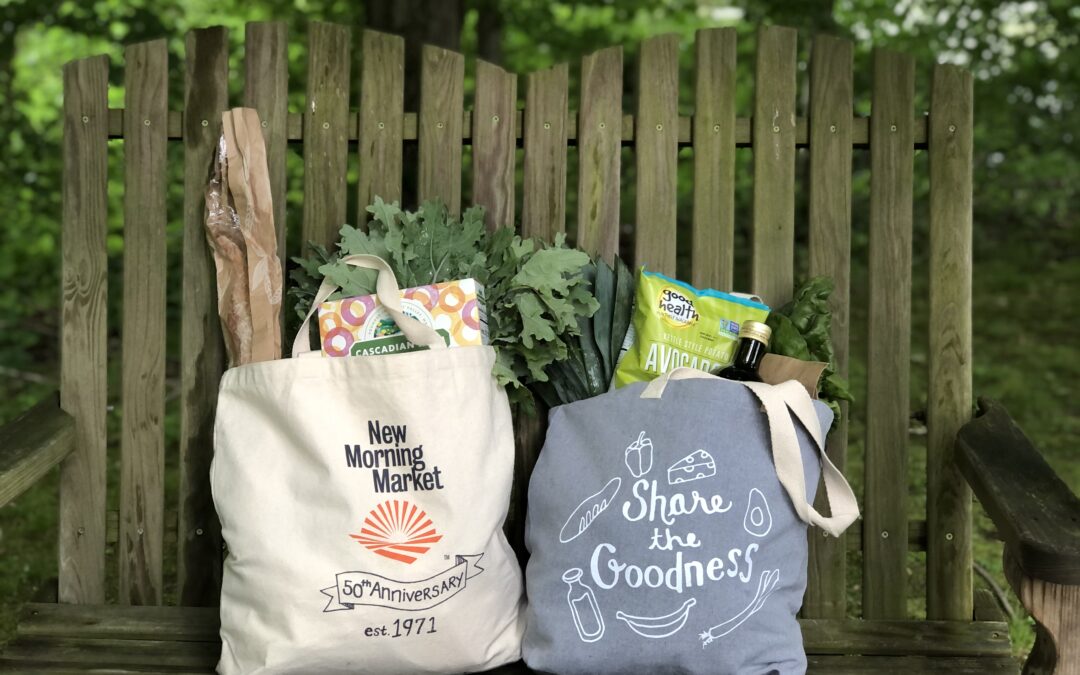Hope is a practice—and every little act counts.
Hope is believing that something you do today, no matter how small, will make a positive difference in the days, weeks, years, and generations to come.
At New Morning Market, hope and vision for a better future have always been at the foundation of everything we do. From our earliest years, we believed that bringing healthy food to our town would spread wellness throughout our communities. We believed that investing in local farmers would help preserve our region’s land and agricultural traditions. We believed that building our store—using reclaimed materials and native pollinator plantings—could sustain our community in a whole new way for generations to come.
We’ve been called hippies. We’ve been called nuts. That’s okay. We know what it means: sometimes it takes a while for the impact of small changes to be seen.
As we’ve shared with you all, our next small change is to eliminate all single-use grocery bags from the store. Starting June 30th, we will no longer offer paper grocery bags at checkout. In encouraging our community to bring their own reusable bags, we stand in the hope that this little change will lead to a much bigger environmental impact in the years to come.
To celebrate the power of small changes, we’ve compiled a list of our favorite “daily little changes” that are fun, affordable, and easy to incorporate into everyday life:
#1 Save Money & Support a Cleaner Environment: Shop Second Hand
According to the Center for Biological Diversity, climate change, biodiversity loss, and pollution are driven in part by our increasing consumption of materials. In fact, the journal Nature Communications reports that more than half of all greenhouse gas emissions are tied to the things we consume. Shopping secondhand is a powerful way to reduce our environmental footprint and shift toward a world where both humans and wildlife thrive.
The Sustainable Jungle posted this list of the 9 Best Thrift Stores in CT – check it out!
#2 Borrow don’t Buy! Support Your Local Library
Before purchasing something new, ask: can I borrow this instead? Libraries offer so much more than books—they provide access to media, tools, seeds, programs, and community space. Choosing to borrow helps reduce waste, save money, and build shared community resources.
Tip: Explore your local library’s offerings—you might be surprised what you can check out!
#3 Get Clever with Food Waste – We Love Leftovers!
According to Move for Hunger, 38% of food grown, processed, and transported in the U.S. ends up in landfills. That waste produces methane—a greenhouse gas more potent than CO₂. The further along the supply chain food is wasted, the greater its environmental toll due to the resources used in its production, transport, and storage.
Tip: Embrace leftovers, meal plan with scraps in mind, and compost when you can.
#4 Use Reusable Whenever Possible
Swapping disposables for reusables may feel small, but it adds up quickly. Every reusable water bottle, coffee cup, shopping bag, or food container replaces dozens—or hundreds—of single-use items. At New Morning, we encourage mindful habits that protect the planet and inspire others to do the same
Tip: Keep a “reusables kit” in your car or bag with essentials like utensils, napkins, and a shopping tote.
#5 Join Your Town’s Buy Nothing Group
Buy Nothing groups are hyper-local online communities where neighbors give, receive, and share items for free—no money exchanged. These groups reduce waste, strengthen local relationships, and keep useful goods in circulation
Find your local group on Facebook or at www.buynothingproject.org.
#6 Buy Organic Whenever Possible
Organic farming supports carbon sequestration, pulling carbon from the atmosphere and storing it in the soil. Healthy soil is key to counteracting climate change, much like natural ecosystems. Organic methods also avoid harmful chemicals, protect pollinators, and build long-term land health
Tip from John Pittari: Grow food you love and use it—even if it’s just a tomato in a pot. Growing food is an act of hope and a good skill to have.
Thank you for being on this journey with us.
Together, every little change becomes a legacy.


Recent Comments